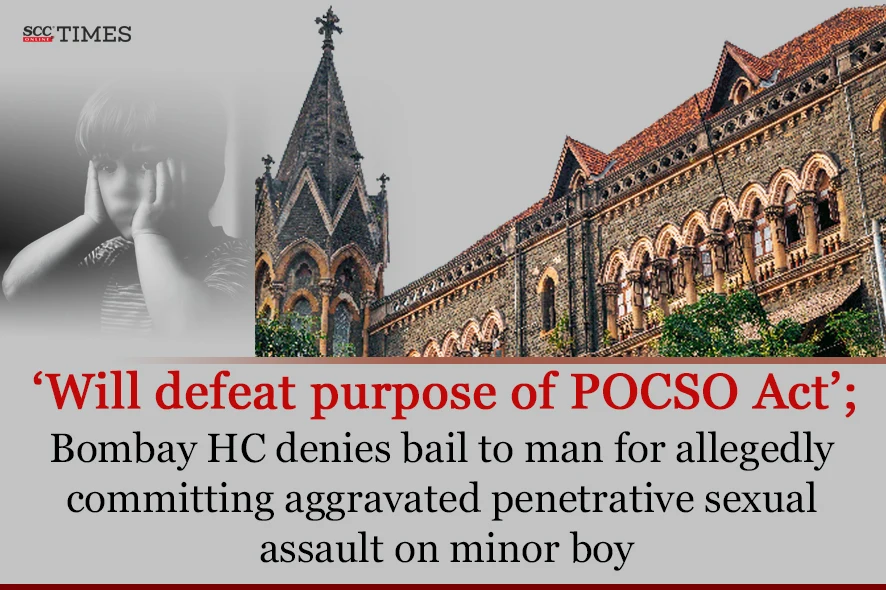Bombay High Court: In an application for regular bail under Section 439 of the Criminal Procedure Code, 1973 (‘CrPC’) in connection with offences alleged under Sections 137(2) and 126(2) of the Bharatiya Nyaya Sanhita, 2023 (‘BNS’) as well as under Sections 4, 6, 8 and 12 of the Protection of Children from Sexual Offences Act, 2012 (‘POCSO’), a Single Judge Bench of Amit Borkar, J., rejected the bail application on the ground that it lacked merit as the applicant-accused failed to demonstrate that the allegations against him were prima facie baseless which was essential for securing bail in such cases.
Background:
The 17-year-old victim and his friend were fishing on Aksa Beach on 31-7-2024 and around 06:30 p.m., the accused approached them and told them to accompany him to see what transpired in the nearby bushes. The accused persisted and succeeded in taking the victim to the bushes where he forcibly removed his clothing and allegedly sexually assaulted him, thereby committing unnatural carnal intercourse with him against his will and consent. The victim alleged that he could not resist and was overpowered and subjected to the alleged sexual assault against his will as the accused possessed greater physical strength than him. Then the victim began crying, whereupon the accused person revealed his name and callously told the victim that he was free to inform anyone about what had transpired. The victim fled and told his friend about the incident and together they went and informed the victim’s mother. Subsequently, they approached the local police station and lodged a formal complaint regarding the incident on the same day at 09:30 p.m.
Analysis and Decision:
The Court observed that there existed sufficient prima facie evidence to suggest the involvement of the accused in the alleged offence. It was noted that the medical examination was conducted on 1-8-2024 which provided credibility to the medical findings given the temporal proximity between the incident and medical examination. The Court opined that the medical opinion, being that of a qualified medical practitioner, carried evidentiary value and could not be brushed aside at the preliminary stage.
Regarding the contention by the accused’s counsel that the victim initially described the accused as a stranger and later mentioned his name, the Court observed that initially the victim might have been in shock and trauma, and the accused might have revealed his identity during or after the commission of the offence, as alleged in the present case. The Court further observed that the absence of a Test Identification Parade, while being a procedural lapse, did not automatically vitiate the prosecution case, particularly when the accused’s identity was allegedly disclosed by himself to the victim.
The accused’s counsel further argued that it was impossible for the accused to overpower the 17-year-old victim without any signs of resistance. The Court opined that sexual offences often involved psychological coercion, fear, and shock, which might prevent the victim from offering effective physical resistance. The Court further stated that the age difference and physical strength comparison could not be determined solely based on the chronological age.
The Court took note that the FIR was lodged at 09:30 p.m. and held that the prompt reporting was consistent with genuine cases and negated the possibility of fabrication or afterthought. The fact that the victim immediately disclosed the incident to his friend and his mother before approaching the police demonstrated natural human behavior in such traumatic situations.
The Court observed that the allegations against the accused involved serious sexual offences against a minor. The nature of the alleged offence was such that it not only caused physical harm to the victim but also inflicted severe psychological trauma that had long-lasting effects on the minor victim. The Courts have consistently held that while considering bail in cases involving sexual offences against minors, the traumatic effect on the victim and the possibility of the accused influencing or intimidating the victim or witnesses must be given due consideration.
The Court highlighted the observation of the Supreme Court that in cases involving sexual offences against minors, the Courts must exercise extreme caution while granting bail. The triple test for bail – (i) prima facie case, (ii) possibility of the accused fleeing from justice, and (iii) likelihood of the accused tampering with evidence or influencing witnesses – must be applied with special rigor in POCSO cases.
The Court opined that the prosecution had successfully established a prima facie case against the accused, the medical evidence corroborated the victim’s statement, and the prompt reporting of the incident added credibility to the prosecution’s case. The Court rejected the bail application as it lacked merit and further observed that while every accused person had a fundamental right to liberty, that right was not absolute and must be balanced against the larger interests of justice, public order, and the protection of victims, particularly when the victims were minors.
[X v. State of Maharashtra, 2025 SCC OnLine Bom 2561, decided on 2-7-2025]
Advocates who appeared in this case:
For the Applicant: Aniket U. Nikam i/by Sumit Patil
For the Respondents: Megha S. Bajoria, APP for Respondent 1-State;
Viral Mukte for Respondent 2-victim (appointed as Legal Aid).




